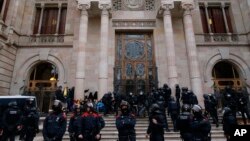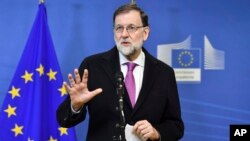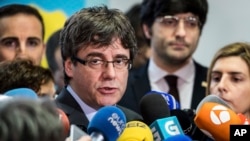Flash protests for and against secession from Spain marked Spanish King Felipe's visit to Barcelona to inaugurate an international exhibit of cell phone producers. It was his first trip to the Catalan capital since an October regional vote for independence.
Separatists poured onto streets, plazas and balconies Sunday banging pots in what has become a ritual act of defiance since Spain's central government imposed direct rule in November, dissolving the regional government.
A swelling crowd of protestors surrounded the city's Baroque Music Palace as the King arrived for the inaugural dinner, forming a symbolic yellow ribbon around the building to highlight the detention of leaders.
But flag waving supporters of unity with Spain also held rallies in the city center to welcome the king, leading to street clashes with separatists indicating the extent to which Catalonia's society is divided. At least two arrests had been reported by Sunday evening.
Tensions have grown in recent days, after Spanish Prime Minister Mariano Rajoy suggested using direct rule provisions to reintroduce Spanish as the main language in Catalan schools.
Catalan teachers' unions have threatened strikes and mass protests to block the measures. "It would be a pedagogic disaster if Madrid tried to control our educational system through a kind of inquisition"the head of the Catalan Teachers' Union, Ramon Fonts, told VOA.
Echoes of Franco
Separatists have equated efforts to impose central control on education to the dictatorship of Francisco Franco of a half a century ago that banned speaking Catalan. But proponents of the measures say post-Franco governments have devolved too much power to regional authorities, which have used the local language to promote separatism and advance their own political interests.
"It's about allowing parents the right to decide in which language they want their children to be educated" said Raquel Cavisner,spokesperson of Convivencia Civica, a Catalan organization promoting unity with Spain. She says that Catalan language "immersion" in schools is a "discriminatory system" that puts children from Spanish speaking families at a disadvantage.
Current Catalan legislation fixes the portion of class time in which teaching can be conducted in Spanish at 25 percent. Such basic courses as mathematics are taught in Catalan, as is Spanish history. "Spanish is generally taught as a foreign language"a Barcelona school teacher said.
While secessionists continue to control the regional parliament, following emergency elections last December, polls consistently show Catalan opinion to be about evenly split. Pro-independence parties received 47 percent of the vote,but the largest vote getter of all seven parties competing in the elections was a unionist center right group, Ciudadanos, which proposes Spanish as main language.
Mixed responses
Resistance to the imposition of Catalan was manifested by hospital workers last week in the Balearic Islands, which would be encompassed in a projected Catalan state. They protested against legislation requiring Catalan for jobs in the health service. "You cure with medicine not with language" chanted about 3,000 nurses and doctors.
But thousands of Catalan independence supporters filled a theater in Barcelona Sunday to hear their exiled leader Carles Puigdemont say via video from Belgium that King Felipe would only be welcomed in the Republic of Catalonia if he "apologized" for opposing independence.
Barcelona Mayor Ada Colau and the president of the Catalan parliament Roger Torrent snubbed Felipe, by boycotting the inauguration of the Mobile World Congress, despite earlier assurances to international sponsors they would not to allow politics to interfere with the event.
Radical Committees for the Defense of the Republic associated with the "anti-capitalist" Catalan Unity Party, scuffled with police as they tried to block access to the convention hall, following a video address by their exiled leader Ana Gabriel.
Secessionist spokesmen blame the exile and jailing of their leaders for their inability to form a government since winning elections two months ago. Marcel Mauri of the pro independence Omnium Cultural says their united opposition to Madrid's moves to take control of education could influence pro-independence parties to resolve their differences and announce a government in the next few days.






